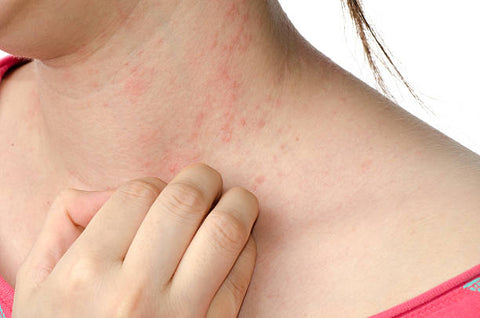What is Contact Dermatitis?
Contact dermatitis is a type of skin inflammation that occurs when an allergen or irritant touches the skin. It can be either irritant contact dermatitis or allergic contact dermatitis. Irritant contact dermatitis comes from chemicals, soaps, detergents, and other substances that cause a reaction when they come in contact with the skin. Allergic contact dermatitis, on the other hand, is caused by coming into contact with an allergen such as latex, nickel, or a cosmetic ingredient.
What Are Contact Dermatitis Symptoms?
Contact dermatitis is an itchy and irritating skin condition caused by contact with certain materials. It can affect any part of the body, but it is most common on the hands, feet, and face. Symptoms of contact dermatitis include:
• Redness, swelling, and itching of the skin
• Blistering, oozing, or dry, scaly skin
• Burning or stinging sensation
• Thickening and cracking of the skin

What Causes Contact Dermatitis?
Contact dermatitis is caused by direct contact with an allergen or irritant. Common triggers include:
• Skin care products and cosmetics
• Soaps and detergents
• Jewelry and clothing
• Latex or rubber
• Metals, such as nickel
• Plant oils
• Medications
How Is Contact Dermatitis Treated?
Treatment for contact dermatitis depends on the severity of the condition. Over-the-counter hydrocortisone cream can be used to reduce itching and inflammation. In more severe cases, a doctor may prescribe a stronger topical or oral corticosteroid. In addition, the following steps can help reduce symptoms:
• Avoid contact with the allergen or irritant
• Use mild, fragrance-free soaps and detergents
• Apply moisturizers regularly
• Wear loose-fitting clothing
• Take an antihistamine
Treating Contact Dermatitis
The first step in treating contact dermatitis is to identify and avoid the allergen or irritant. If the source is unclear, your doctor may suggest patch testing to identify the cause.
Once the source of the rash is identified, the next step is to treat the symptoms. This may involve using topical steroids or antihistamines, as well as cold compresses and moisturizers. In some cases, oral steroids may be prescribed.
Preventing Contact Dermatitis
The best way to prevent contact dermatitis is to avoid the irritant or allergen. If you know what triggered your rash, you should avoid coming into contact with that substance in the future. It may also help to use gloves when handling chemicals or harsh soaps and detergents.












